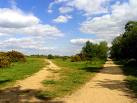
The wild paths of nature?
The love of Nature in industralised countries is, looked at historically, a bizarre phenomena. We spent centuries (even millenia) being frightened of nature, wary of it and struggling within it to survive. It was only when we had dominated it, repressed it, that we suddenly came to develop a love affair with it. Once we were safely divorced from nature, and her powers had been tamed to such an extent that we could control our own destiny, did we come to love the concept of ‘nature’.We have been locking tracts of nature up into small parcels called parks dominated by human law (fences, signs, boundaries a.k.a. environmental management) for the last 150 years, about the point that the industrial revolution had succeeded in divorcing us from our natural surrounds and encapsulating us in the mechanical life of the machine.
We use nature for two purposes. Firstly, recreation. For some people this means tearing up the ground with 4WD or deafening birds with the roars of motorbikes or disturbing possums with the riotous thump of a rave party. At the other pole it means days of walking alone absorbing the beauty and stillness of wondrous sites. But most people would not enter a park when it has, for example, been raining. I remember a friend who was going walking in the You-Yangs near Melbourne. It was raining and he received a phone call from the organiser to say the walk was canceled. It caused me to think that the group was going for a walk in a park, not ‘nature’, and only when the weather was right. This is a perfect example of the way we have controlled our relationship with nature. It is only in that control that we become comfortable enough to enter it. In effect we have created parks for our pleasure. The wildness of nature is destroyed or at least pushed away to a safe distance.
The other relationship people have with nature is reverential. It has become a kind of religion; ‘she’ is worshiped. Hordes of Green voters plunge through national parks for days on end and come out the other end with a glow you never see in an urban dweller. There is no doubting the power nature has to restore and regenerate those willing to tackle her distances. However this is still a park mentality. We follow paths erected by environmental managers and are safe in the knowledge that several helicopters followed by the media will come to our rescue should any danger befall us. How many people would actually disappear into nature? In the movie ‘Into the Wild‘, based on a true story, we see a man face the reality of living in nature when he truly leaves civilisation behind him. Another rare story is that of the ‘Squatters Arms‘. A couple traveling around Australia on a yacht discovered an isolated part of the bush in the Kimberlys and decided to stay put. They battle with typhoons and hordes of snakes and isolation (and they love it), but these experiences are truly natural, unlike rambling down carved out paths, ready to run back to the car at the first hint of rain.
In his book ‘The Tuning of the World’, Murray Schafer describes a soundscape survey (conducted in the seventies) where people around the world were asked to respond to different sounds. Here is what he had to say:
As people move away from open-air living into city environments, their attitudes toward natural sounds become benign. Compare Canada, New Zealand and Jamaica. In the two former countries, the sounds of animals were scarcely ever found to be displeasing. But every one of the Jamaicans interviewed disliked one or more animals or birds – particularly at night.
This doesn’t require much explanation. It is suggestive that the further we are from nature the more we romanticise it. Jamaica is now a developed country. I wonder what the survey results would be now?
I love absorbing the power of ‘nature’ and I think it is important lock up tracts of land so other animals have the space to survive and evolve. It is people’s relationship to nature I find fascinating. How can we come to worship something we spent so long escaping from? Or is that we didn’t escape, but were just seduced by a lifestyle that took as further away from the source of our existence? Is our ideation of nature a reflection of our desire to return to it? There are some cultures that remain intact with their natural lifestyles, notably in the Amazon and PNG, but how long can they resist the prying fingers of the Western machine and the allure of the bright lights of civilisation? We had hundreds of years to have our link with nature severed while we got used to locking her wildness away in manageable parks. But true ‘nature’ dwellers who are thrust out of their lives in the modern world have insurmountable challenges to face.
What if civilisation should one day fall, and our buildings crumble and nature slowly swallows our cities? We would be back in nature. Struggling to survive, eking out an existence. There would be little time to walk along paths and gasp at natures beauty then. What would our relationship with nature be like in this scenario?
![P14-08-09_14.30[01] P14-08-09_14.30[01]](https://live.staticflickr.com/4039/4366223984_6777a14bf3_s.jpg)
![P11-11-09_14.23[01] P11-11-09_14.23[01]](https://live.staticflickr.com/2510/4366223002_d4c1aee3ef_s.jpg)
